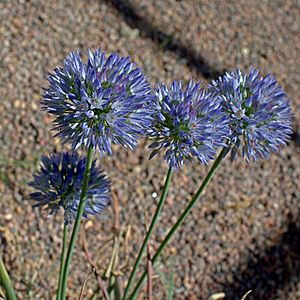Allium caesium facts for kids
Quick facts for kids Allium caesium |
|
|---|---|
 |
|
| Scientific classification |
|
| Kingdom: | Plantae |
| Clade: | Tracheophytes |
| Clade: | Angiosperms |
| Clade: | Monocots |
| Order: | Asparagales |
| Family: | Amaryllidaceae |
| Subfamily: | Allioideae |
| Genus: | Allium |
| Species: |
A. caesium
|
| Binomial name | |
| Allium caesium Schrenk
|
|
| Script error: The function "autoWithCaption" does not exist. | |
| Synonyms | |
|
|
Script error: No such module "Check for conflicting parameters".
Allium caesium, also known as light blue garlic, is a beautiful flowering plant. It is a perennial plant, which means it lives for many years. This plant is famous for its pretty sky-blue flowers. It is originally from central Asia.
Contents
About Light Blue Garlic
Allium caesium is a type of herb. This means it has soft stems, not woody ones like trees. The plant is called "caesium" because its flowers are a lovely grey-blue color. The word caesium comes from Latin and means "grey-blue".
Where Light Blue Garlic Grows
This plant naturally grows in central Asia. You can find it in countries like Xinjiang (a region in China), Kazakhstan, Kyrgyzstan, Tajikistan, and Uzbekistan. It likes to grow in dry places. These include deserts and open fields. It can be found high up in the mountains, from about 700 to 2,000 meters (about 2,300 to 6,500 feet) above sea level.
What Light Blue Garlic Looks Like
Allium caesium usually grows to be about 30 to 40 centimeters (12 to 16 inches) tall. It grows from small, round bulbs. These bulbs are like tiny onions, about 15 millimeters (0.6 inches) wide. The plant has tall stems called scapes. These can reach up to 65 centimeters (26 inches) high. Its leaves are round and a bit shorter than the stems.
The most striking part of the plant is its flowers. They are a bright sky-blue color. These flowers usually bloom in the summer. In places like England, you can see them from June to August. The bright flowers attract many pollinators. Bees and butterflies love to visit them. They help the plant make seeds.
Growing Light Blue Garlic
If you want to grow Allium caesium, it does best in sunny spots. It can also grow well in places with some shade. This plant has received an award in the UK. The Royal Horticultural Society gave it the Award of Garden Merit. This award means it is a great plant for gardens.
In the US, this plant can grow in certain areas. These areas are called hardiness zones 4 to 7. These zones tell gardeners which plants can survive the winter in their region.
See also
 In Spanish: Allium caesium para niños
In Spanish: Allium caesium para niños
 | Georgia Louise Harris Brown |
 | Julian Abele |
 | Norma Merrick Sklarek |
 | William Sidney Pittman |

